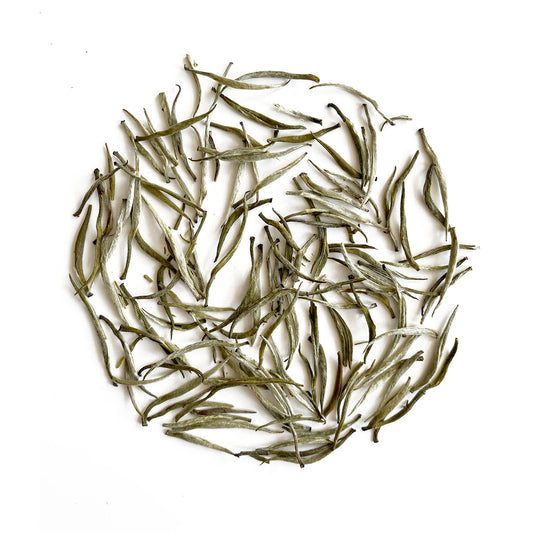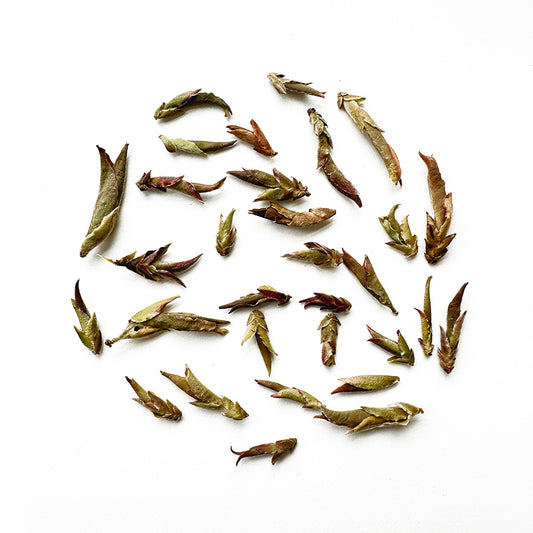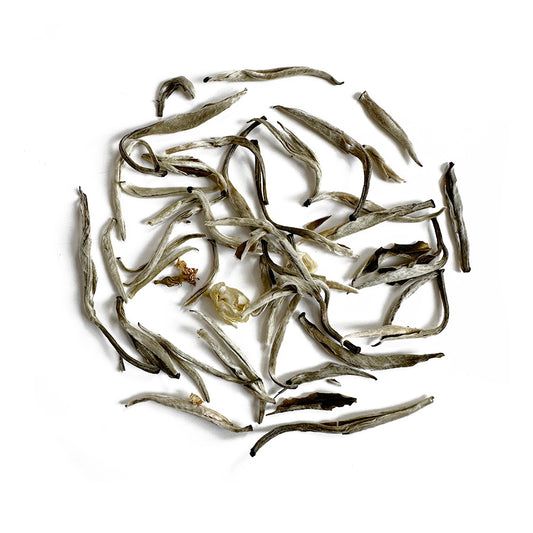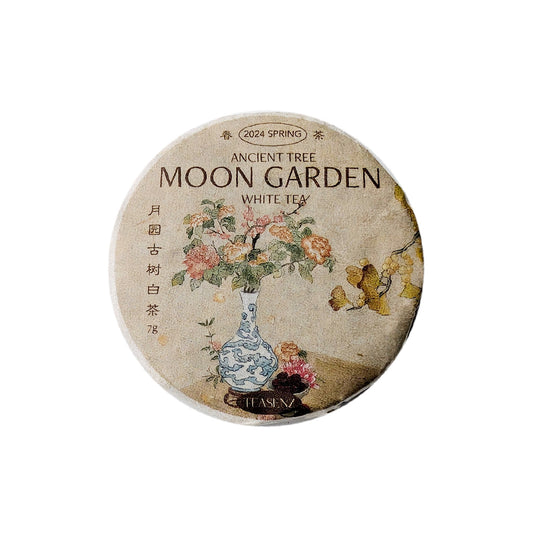Collection: White Tea
-
Moon Garden White Tea Cake 200g
Regular price €28,75 EURRegular priceUnit price / per€31,95 EURSale price €28,75 EURSale -
Silver Needle (Bai Hao Yin Zhen) White Tea
Regular price €15,95 EURRegular priceUnit price / per -
Bai Mu Dan (White Peony) White Tea
Regular price €11,95 EURRegular priceUnit price / per -
Wild Purple Yabao Tea, Da Xue Mountain
Regular price €14,50 EURRegular priceUnit price / per -
'Jasmine Silver Needle' White Tea
Regular price €12,95 EURRegular priceUnit price / per -
2024 Moon Garden White Tea, Mini Cakes 7g
Regular price €11,95 EURRegular priceUnit price / per -
2023 Oripuerlab Moon Light White Liu Bai Tea Cake
Regular price €51,95 EURRegular priceUnit price / per -
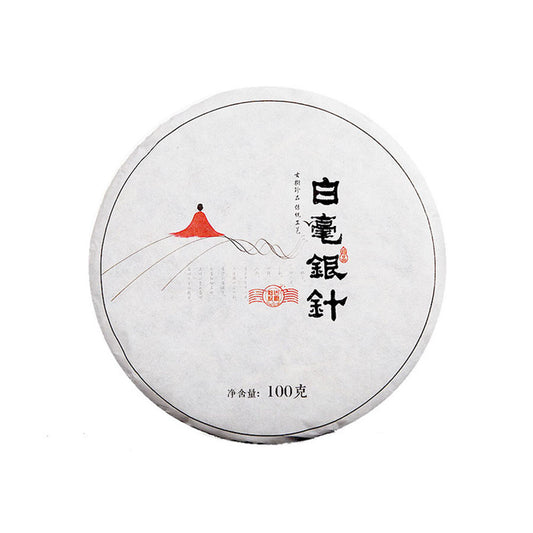 Sold out
Sold outMoonlight White Silver Needle 100g
Regular price €13,95 EURRegular priceUnit price / per -
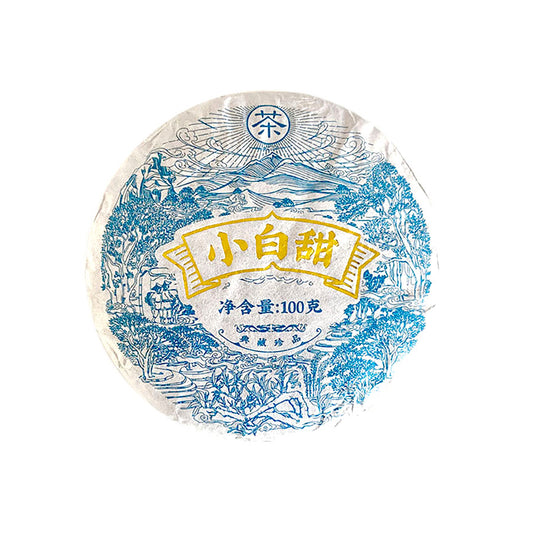 Sold out
Sold outBai Mu Dan 'Xiao Bai Tian'
Regular price €9,95 EURRegular priceUnit price / per -
2019 Moonlight White (Yue Guang Bai) White Tea Balls
Regular price €8,95 EURRegular priceUnit price / per -
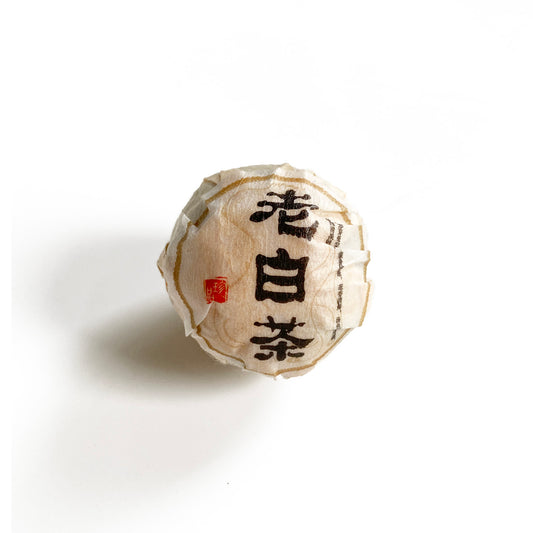 Sold out
Sold out2019 Aged Shou Mei White Tea Balls
Regular price €8,50 EURRegular priceUnit price / per -
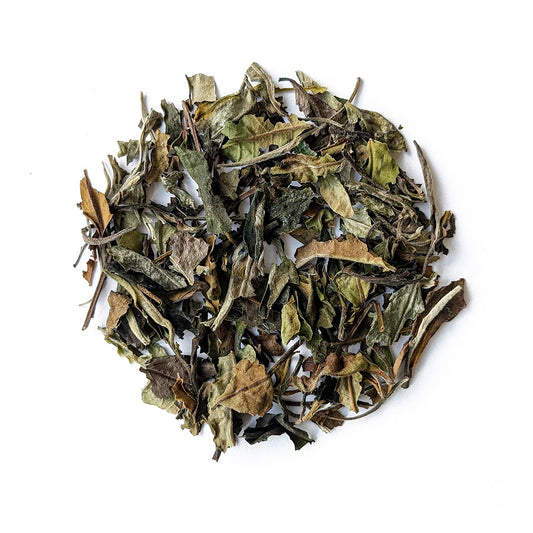 Sold out
Sold outFujian Shou Mei White Tea
Regular price €9,50 EURRegular priceUnit price / per -
Jun Shan Yin Zhen (Silver Needle) Yellow Tea
Regular price €13,00 EURRegular priceUnit price / per -
2023 Mang Fei Ancient Tree Aged White Tea
Regular price €6,95 EURRegular priceUnit price / per -
Oripuerlab Tian Bai 'Today's Tea' Pressed White Tea, 2g Bags
Regular price €22,95 EURRegular priceUnit price / per -
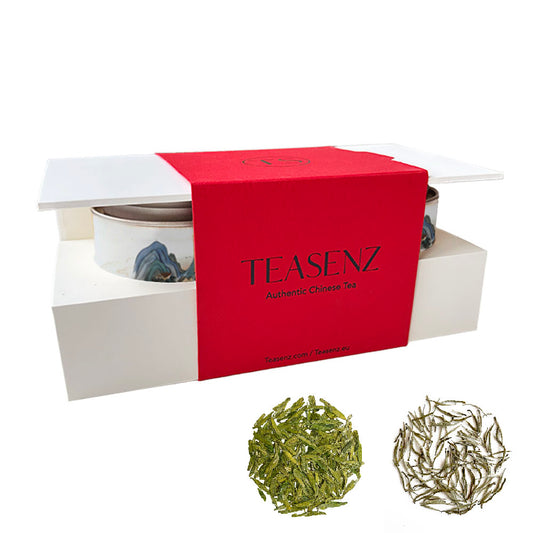 Sold out
Sold outTeasenz Green & White Tea Gift Box
Regular price €35,90 EURRegular priceUnit price / per
Do you have questions about White Tea?
White Tea 101
What is White Tea
Minimal processing: White tea is a minimally processed tea made from leaves of the Camellia Sinensis tea plant. Unlike other teas, white tea isn't rolled or pan-roasted (which is a method to stop oxidation). Instead, white tea leaves are simply thinly spread on a bamboo surface to wither and dry. Depending on the tea master's choice, the leaves made be dried indoor or sun-dried outdoors. Sometimes the tea master may choose for machine drying.
The minimal processing of tea leaves preserves the natural flavor and aroma, as well as the fine silvery-white hairs on the unopened buds, which give white tea its name.
White teas are semi-oxidized: Because there’s minimal processing involved, white tea is often considered the least oxidised tea. This is in fact untrue. During the drying process, the tea leaves actually undergo a withering process. Hence, white teas are known to be semi-oxidised teas.
White tea & fermentation: The enzymes in white tea are still active, because the oxidation wasn't stopped during the production process. As a result, the white tea leaves continues to slowly oxidise after processing. This fermentation process gradually enhances the flavour and aroma of white tea. Sometimes, white teas are steamed and pressed into round cakes, as they are more convenient to store for further aging.
White tea grades: White teas from Fujian province are classed in 4 grades from high to low: Bai Hao Yin Zhen (Silver Needle), Bai Mu Dan (White Peony), Gong Mei (Tribute Eyebrow) and Shou Mei (Lifetime Eyebrow). White teas from Yunnan province are generally called Yue Guang Bai (Moonlight White), though different grades also exist.
What are the benefits of White Tea
White teas are known to contain many healthy antioxidants. However, unlike green tea and black tea, there are not many cohort studies on white tea, which are studies that follow a group of people over time and measure their health outcomes. Unfortunately, most of the health evidence on white tea comes from animal studies, which may not be applicable to humans.
There’s only one cohort study that examined the benefits of white tea. It was conducted in China and involved 1,210 participants aged 40 to 65 years old. The study followed them for five years and measured their blood pressure, blood sugar, blood lipids, and body mass index (BMI). The study found that drinking white tea was associated with lower blood pressure, lower blood sugar, lower triglycerides, higher HDL cholesterol, and lower BMI. The study also found that drinking white tea was more beneficial than drinking green tea or black tea.
White Tea & caffeine
Does white tea have caffeine? Yes, white tea naturally contains caffeine, but the amount varies depending on several factors, such as the origin, quality, grade of the tea leaves, amount of tea used, water temperature, and steeping time.
Generally, a cup of white tea has less caffeine than most other types of tea, due to its low recommended steeping temperature of 80ºC. A cup of white tea (8oz / 250ml) may contain about 15-30mg of caffeine.
However, higher grades such as silver needle and white peony may contain more caffeine than lower grades. On the other hand, lower grades are often steeped at higher temperatures, which possibly results in higher caffeine levels. Thus, it’s hard to exactly determine the amount of caffeine in white tea.
Where to buy White Tea
Because white tea has become popular in the past years, it’s widely available in supermarkets, local tea shops as well as online. For authentic and fresh Chinese white tea we recommend you to shop in either our EU tea store (Teasenz.eu) or global tea store (Teasenz.com)
Other FAQ about White Tea
Does white tea stain teeth?
Yes, even though white tea has a lighter tea liquor it does still stain your teeth.
How to brew white tea?
Generally we recommend to steep white tea at 80ºC, while the steeping time will depend on whether you apply the traditional or western steeping method. No white tea is the same. Thus we recommend you to visit our individual white tea pages and read our tailored instructions for preparation.
Is oolong tea white tea?
Teas are classified based on the tea leaves are processed. Because the production process of oolong tea is very different from that of white tea, they aren’t the same. For more information about oolong teas and how they differ, we advise you to visit our oolong tea page


